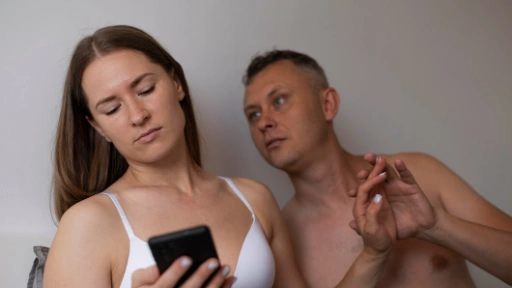The first time a husband notices his wife’s eyes linger too long on another man, he doesn’t always say something. Often, he just watches. Not the man—her. He watches the dilation of her pupils, the slight hitch in her breath, the way her shoulders shift back, unconsciously asserting confidence.
Sometimes, it happens in public—on the beach, at a party, in a dimly lit bar—and sometimes it’s within the sterile fluorescent confines of a grocery store. But the setting doesn’t matter. What matters is the moment. A spark. An awareness that something has changed.
And that change is not a betrayal. It’s an invitation.
But that’s the terrifying part.
As a therapist, and as someone who has lived through this dynamic personally, I can tell you the greatest emotional tension in any cuckold journey is not during the act—it’s in the lead-up. It’s when desire enters the marriage not as a flame, but as a question mark. A whispered what if, hovering at the edge of the marital bond.
For most men, it’s not the sex they fear—it’s the meaning.
And for most women, it’s not the act they crave—it’s the freedom.
So, let’s sit with that tension. Let’s examine it—because what we do with those moments of discomfort, uncertainty, and arousal will shape everything that follows.
The Emotional Terrain of Pre-Encounter Intimacy
When I speak with couples on the cusp of their first real encounter with cuckoldry—before the wife has even so much as flirted intentionally with another man—what I find most striking is the emotional rehearsal that happens in their minds.
He imagines her touching someone else.
She imagines being wanted without restraint.
He wonders if she’ll enjoy it more than being with him.
She wonders if she’ll lose him if she enjoys it too much.
What fascinates me as a clinician is how rarely these fears and fantasies are voiced at first. Instead, they get tucked beneath passive agreements: “We’ll see how it goes,” or “I’m fine if you flirt.” But inside, both partners are navigating one of the most psychologically complex zones a couple can enter: pre-consensual erotic divergence. It’s not yet action. It’s not yet infidelity. It’s potential.
And potential is where intimacy is either forged or fractured.
The wife, in this phase, often experiences a surge of confidence mixed with guilt. She may feel desirable again in ways that domestic intimacy hasn’t offered her in years. The husband, meanwhile, is often simultaneously aroused and destabilized by the idea of no longer being her only object of desire.
From an evolutionary perspective, what’s happening is both ancient and subversive. We are biologically programmed to seek mating security—especially men, who historically faced the reproductive uncertainty of paternity. But we are also wired for novelty, for exploration, for the arousal of competition and contrast.
When her eyes wander, then, it’s not just about sex. It’s about unearthing these conflicting instincts and bringing them into the relationship with honesty and care.
How Tension Becomes Intimacy
Let me take you into a real moment—a memory, one that shaped my own path.
We were at a beach. It was late afternoon, the sun low enough to cast everything in gold. A man walked by, shirtless, tanned, confident. He looked at me. I looked back. And I didn’t look away.
My husband saw it. I felt the air change between us.
Later that evening, we didn’t argue. We didn’t even talk about it. We just lay in bed, the silence heavy. But my heart was pounding—not from guilt, but from the realization that I wanted something I hadn’t wanted in years: to be chosen. To be seen by someone who didn’t already know my every flaw and story.
And when we finally did talk, it wasn’t easy. I admitted I liked the attention. He admitted he felt replaced. But somewhere in that vulnerable exchange, we started to ask the questions that mattered:
What if this doesn’t mean I love you less?
What if it could make us stronger?
The truth is, most couples reach this crossroads. Maybe not with cuckoldry, maybe not even with anything sexual. But they arrive at the place where one partner desires something the other doesn’t yet understand. And they must choose: suppress it—or integrate it.
Cuckoldry, for some, becomes a path of integration.
The Bull as Symbol, Not Threat
When a wife first fantasizes about another man, she’s not necessarily fantasizing about infidelity. She’s fantasizing about feeling free. The bull is not always a person—he’s a symbol. Of erotic charge. Of power. Of choice.
For the husband, this is where many retreat into fear. What if I lose her? What if I’m not enough? What if this dynamic opens a door that can’t be closed?
But here’s what I remind every couple:
The bull is not a threat unless you give him your silence.
When couples explore the dynamic together—when they talk about it, roleplay it, tease it into existence—the bull becomes not a replacement, but a shared creation. He is summoned. He is chosen. By her, yes—but also by the couple’s consent.
In sessions, I often use the metaphor of fire. Alone, it can burn. But contained, intentional, and respected—it can light a home. The pre-bull phase is when the couple learns to build the hearth.
Reshaping Masculinity Before the First Encounter
For many husbands, the period before their wife’s first bull is when they confront a deeper question:
What kind of man am I, if I’m not the only one she wants?
It’s not just sexual jealousy—it’s existential. We’ve trained generations of men to equate their masculinity with exclusivity. But the cuckold dynamic asks them to redefine strength as vulnerability, control as consent, and value as presence—not possession.
This is why some men break during this phase. Not because the act itself is intolerable, but because the identity they’ve built around being “the one” is now under reconstruction. And like any renovation, it’s messy before it’s beautiful.
But those who stay—those who stay and talk and grow—often emerge with a deeper emotional fluency than they’ve ever had. They become not weaker, but more aware. Not emasculated, but redefined.
What Happens Next
There’s a phrase I often use with new clients:
“You don’t have to say yes to the experience. But you do have to say yes to the conversation.”
Because when her eyes wander, when your heart races, when your mind fills with both dread and desire—those are not signs to shut down. They are signs that something inside your relationship is asking to evolve.
Not every couple takes the step toward a bull.
But every couple who reaches that threshold learns something they didn’t know before:
That intimacy is not the absence of desire for others.
It’s the honesty to bring those desires home.



